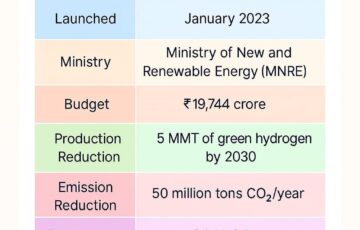China Leads Africa’s Nuclear Energy Market Amid Competition
Why in the News ?
China’s state-owned companies, CGN and CNNC, are expanding nuclear energy projects in Africa, securing MoUs with countries like Nigeria and Uganda. This dominance challenges other players, including India, seeking uranium resources for its nuclear energy goals.
Africa’s Growing Nuclear Energy Ambitions:
- The Russia-Ukraine war highlighted the need for energy security, pushing African countries to explore nuclear energy for reliable electricity access.
- Currently, Koeberg in South Africa is the only operational nuclear plant in Africa, built by a French consortium.
- By 2035, Africa aims to produce 15,000 MW of nuclear energy, offering an investment opportunity worth $105 billion.
- Countries like Ghana, Nigeria, Sudan, Rwanda, Kenya, and Zambia are planning nuclear projects to boost electricity access.
Global Competition in Africa’s Nuclear Market
- France has long dominated Africa’s nuclear market but is now losing influence, especially in Francophone Africa.
- Since 2023, the US-Africa Nuclear Energy Summit (USANES) has sought to strengthen S. presence, but the future direction depends on U.S. President Donald Trump.
- Russia has agreements with Egypt, Mali, Burkina Faso, and Burundi and is constructing a nuclear reactor in El Dabaa, Egypt through Rosatom. However, economic challenges and sanctions limit Russia’s expansion.
- South Korea’s KHNP is also exploring the market, but China has emerged as the clear frontrunner.
China’s Dominance and Impact on India
- China’s nuclear expansion in Africa is driven by state-owned giants CGN and CNNC, offering training, scholarships, and technical support.
- Recent MoUs with Nigeria, Uganda, and Kenya further strengthen China’s influence.
- India’s nuclear ambitions face challenges from China’s dominance and influence over uranium-rich African nations.
- This could hinder India’s goal of generating 100 GW of nuclear energy by 2047 and affect energy security in the long run.
Why Africa Was China’s First Stop for 34 Years?● Historical Context: ○ 1950s: Supported African liberation movements; 1970s: African support secured China’s UN Security Council seat. ● Evolution of Relationship: ○ 1999: “Go Out Policy” promoted investments in Africa. ○ 2000: Established FOCAC for diplomacy, investment, and trade. ○ 2013: BRI deepened economic and strategic ties. ● China’s Objectives in Africa: ○ Resource Access: Securing cobalt, platinum, coltan for tech industry. ○ Geopolitical Alliances: Gaining support in UN and for One China Policy. ○ Currency Strength: Promoting RMB trade and debt restructuring. ○ Commercial Opportunities: Africa as a market for goods, young workforce. |





